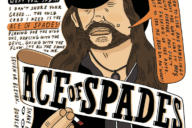You can’t move for supposed ‘inspirational stories’ in the modern press. We all love an underdog, an empty handed, down-on-their-luck hero to represent that the word ‘impossible’ is actually impossibility. Vic Chesnutt is unlikely to be a story you’ve seen in your newspaper.
Chesnutt was an adoptee with a love for all things music. At the age of five (yes five!), he started writing songs. Until 18, when Chesnutt’s world was turned on its head, right at beginning of his musical journey. A car crash left Vic, a quadriplegic from the neck down. Where to go from here? Music never dies. This is where the broken beauty began his soaring flight. His 18 albums, mixing dark humour with the melancholy of Jeff Buckley, were widely praised by R.E.M frontman Michael Stipe, who produced two of Chesnutt’s albums, including his 1990 debut, Little.
His tragic death, induced by muscle relaxants, cut a huge shockwave across America and especially in the heart and mind of fellow musician, entrepreneur, writer and humanitarian Kristin Hersh. ‘I first saw Vic at a sound check before one of his shows, introduced by a mutual friend. He was standing up over his amp.’ This was not going to be a fly-by-night, one time meeting. Hersh was awestruck by Chesnutt’s tragic, emotionally flawed beauty. This was the start of a close friendship and kinship that would last until Chesnutt’s death on Christmas Day 2009. ‘My first meeting with Vic would be the last time I ever saw him stand. A year after our first meeting, he was my opening act on my world tour. He really was an unbelievable man. His sound still emanates with me now, as much as it did then.’
Maybe now, six years after this shocking demise, is the right time for the release of Hersh’s book about her friend’s struggles in life, musically, physically and emotionally. Don’t Suck, Don’t Die, a title coming from a childlike promise made between the sibling like friends, is not only a tribute to an undercover musical genius but a salute to a friend on the edge. ‘Obviously looking back, this promise is totally impossible, but at the time, it seemed really rock and roll and I guess it drove us both on’ Hersh reminisces. ‘Vic’s life was a rollercoaster and that’s why this needed to documented. Every moment with him was either belly-laughs or soul-wrenching tears.’
Writing the book has equally been a rollercoaster of emotion. Memories of every moment in the dark corners of Chesnutt’s mind without a flashlight to call up and every hilarious hearty giggle meant Don’t Suck, Don’t Die was ‘incredibly fun to write, but heart-wrenching in its final third…’ Hersh seems to lose track for a moment. This has clearly been a journey on which she has been relieved to finished and has been emotionally straining. Vic’s memory is still raw, but you’d come to expect that from a hard-headed woman who has lost her partner in crime.
‘In all honesty, I never intended to write this book. I never thought it possible, despite the fact I wanted Vic’s memory to live on. It started as a brief article, in which I’d write tragically, beautifully and emotionally [much like’s Vic’s music] about a pure musical icon who didn’t get on with the music industry.’ This is when the project morphed, if only accidentally. Hersh is just that nice (if she does say so herself!)
‘I said ‘yes’ to something meaning ‘probably not,’ you know, just to get people off your back. I waited and waited. The publisher then emailed me asking how many words I’d done. Honestly, it was next to nought. I asked how many words they wanted’ Unbeknownst to the lovely rock star, she’d agreed to write a book. ‘After that, I just went and did it. I really am just that nice!’ Hersh chuckles.
Sadly, Chesnutt couldn’t afford his own medical bills and this lead to his internal collapse as well as his external pain. This lead to Kristin setting up a relief fund to appeal to the community to stop her friend’s suffering. But the difficult times were always topped by the endless list of happy times.
‘My favourite memory of my time with Vic is lying by a lake in Madison, Wisconsin, listening to each other’s new songs with our spouses. The music floated over us and into the trees, none of us speaking because none of us ever talked over real music.’ Hersh pauses, sighs, almost lost in a moment of distant tranquillity shared with a friend she muses ‘I feel like that moment is still going on.’
Dan Shorthouse
Hersh’s book, Don’t Suck, Don’t Die is published by The University of Texas Press in October 2015.







